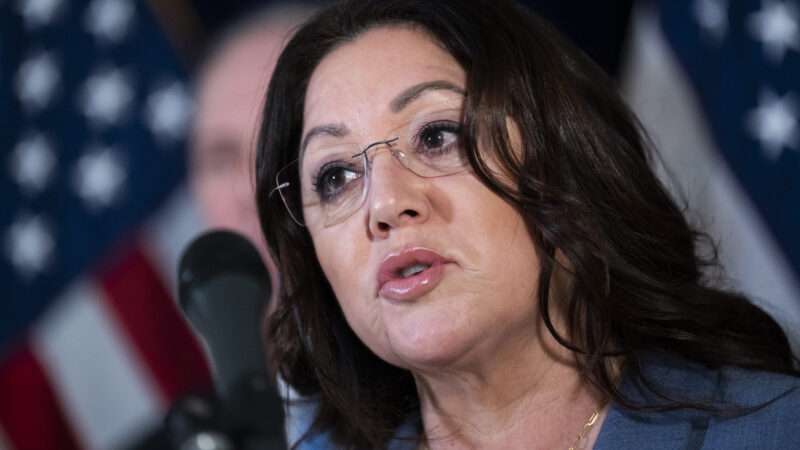
As a member of Congress, Rep. Lori Chavez-DeRemer (R–Ore.) teamed up with Vice President Kamala Harris and teachers union bosses to push a proposal that would effectively override state-level reforms to limit the power of public sector unions—like those championed by Republicans in Wisconsin and Florida.
That might seem like it would make Chavez-DeRemer an unlikely choice for secretary of labor in a Republican administration. But President-elect Donald Trump is reportedly considering giving her exactly that gig.
Politico reported earlier this week that Chavez-DeRemer was "in the mix" to run the Labor Department, and she has the backing of some high-profile labor union leaders including Teamsters President Sean O'Brien. Randi Weingarten, president of the American Federation of Teachers (AFT), tweeted approvingly of Chavez-DeRemer's consideration for the job on Thursday.
The outpouring of support for Chavez-DeRemer from labor unions probably reflects her record as one of the most pro-union Republicans in Congress. She's one of three House Republicans to endorse the Protecting the Right to Organize Act (PRO Act), a grab bag of big labor agenda items that would extend some of California's awful independent contractor regulations nationwide, abolish so-called "right to work" laws in the 27 states that have passed them, and expand the powers of the National Labor Relations Board, among other things.
She's also one of a handful of Republicans to cosponsor the Public Service Freedom to Negotiate Act, which is best described as a federal power grab that allow public sector labor unions (like the AFT) to force their will on states that have limited the power of those unions. As Dominic Pino notes at National Review, the bill would "effectively rewrite labor-relations law in roughly half of the states, many of them Republican-governed, which currently either prohibit collective bargaining by public employees or don't explicitly authorize it."
Trump's rise to political power has been helped by a shift in voting patterns among union workers, who are no longer the solidly Democratic cohort they once were. That shift, combined with Trump's willingness to make unorthodox staffing decisions, likely explains how someone like Chavez-DeRemer ended up on the transition team's short list.
Even so, choosing Chavez-DeRemer would signal that Trump believes it is more important to signal support for labor unions than to stand up for American workers. The right-to-work laws that Chavez-DeRemer would like to use federal power to overturn merely ensure that workers cannot be coerced into joining unions—or funding them, via dues taken directly from workers' paychecks.
"To represent workers does not mean to copy the views of union bosses," wrote Mark Mix, president of the National Right To Work Committee, a nonprofit, in a letter to Trump on Wednesday, urging the incoming president to nix Chavez-DeRemer as labor secretary. "The next Trump Administration should seek to expand choice for workers so that every American can freely choose whether or not a union deserves their financial support."
Chavez-DeRemer won't have a chance to vote for those pro-union bills in next year's Congress, because she lost her reelection bid earlier this month. There's no reason for Trump to throw her a political lifeline now.
The post Will Trump's Labor Secretary Pick Be a Big Win for Public Sector Unions? appeared first on Reason.com.





